Introduction
The real estate business is all about crafting a great customer experience. With the increasing migration of customers to the digital world, it has become essential for real estate companies to understand what potential leads need and how they can leverage digital real estate marketing tools to provide the best experience compared to their competitors.
In this competitive market, real estate professionals need to leverage the latest real estate marketing tools to stay ahead. The right real estate marketing tools can significantly enhance an agent's efficiency and effectiveness.
Moreover, the number of real estate agents is growing day by day, with the most advanced ones quickly dominating the market. Therefore, the main goal of real estate agents and marketers is to effectively promote their projects online, respond quickly to inquiries, nurture leads, and ultimately convert more contacts into listings and purchases.
In this article, we have compiled a list of the top real estate marketing tools segmented as per different use cases.
Importance of real estate marketing tools
Real estate marketing tools are essential for several reasons. They help streamline operations, improve client interactions, and enhance overall marketing efforts. Here’s a closer look at their importance:
- Streamline Operations: Using a CRM (Customer Relationship Management) system can centralize all client information, making it easier to manage leads and follow-ups. For instance, a real estate marketing tools agent in San Francisco used a CRM to track client interactions and significantly reduced the time spent on administrative tasks.
- Improve Client Interactions: Tools like chatbots for real estate marketing tools allow for immediate responses to client inquiries. An agent in Miami implemented a chatbot on their website, providing instant answers to potential buyers’ questions, which increased client satisfaction and lead conversion rates.
- Enhance Marketing Efforts: Social media management in real estate marketing tools helps schedule and analyze posts, ensuring a consistent and effective online presence. A New York City agent used a tool like Hootsuite to manage multiple social media accounts, resulting in more engagement and higher visibility.
Social Media Management for real estate marketing tools
Social media has become an essential part of real estate marketing tools strategies. With the right real estate marketing tools, agents can manage their social media presence effectively, engage with potential clients, and showcase properties.
Here’s how social media management real estate marketing tools can boost your marketing efforts.
Benefits of Using Social Media Management Tools
Social media management tools offer numerous advantages for real estate marketing tool agents. They streamline processes, enhance engagement, and provide valuable insights. Here’s how:
- Improved Engagement: Social media tools help track interactions and respond promptly. An agent in New York City used Hootsuite to monitor and reply to comments and messages, improving client engagement and satisfaction.
- Analytical Insights: These real estate marketing tools provide detailed analytics on post-performance. A Chicago realtor used Sprout Social to analyze which types of posts generated the most engagement, allowing them to refine their content strategy.
- Cross-Platform Management: Managing multiple social media accounts from one dashboard saves time. An agent in Miami used Later to handle their Facebook, Instagram, and Twitter accounts, making it easier to maintain a cohesive online presence.
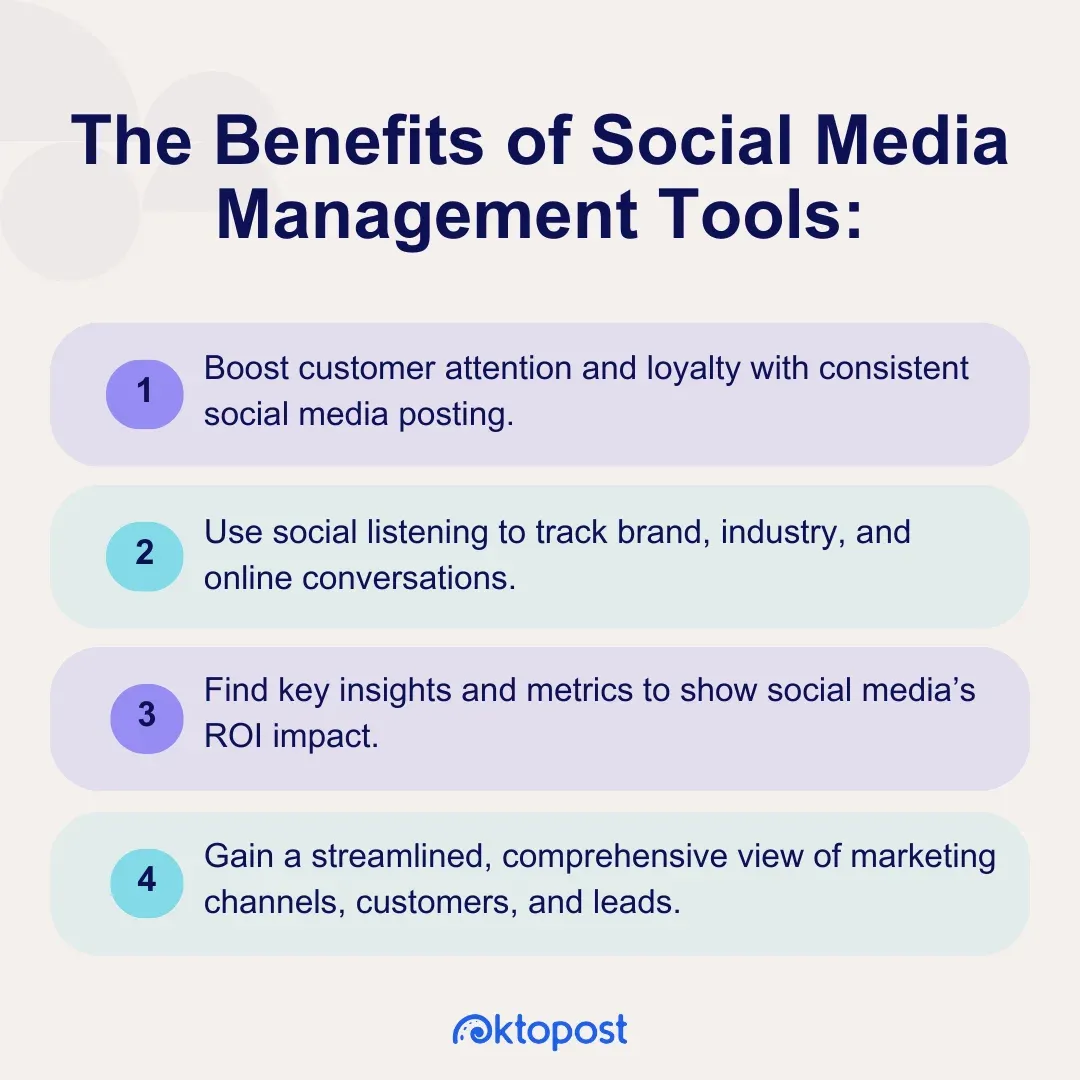
Recommended Social Media Management for real estate marketing tools
To maximize the benefits of social media marketing, here are some recommended tools:
- Hootsuite: Manages multiple social media accounts, schedules posts, and provides analytics. A realtor in Denver used Hootsuite to keep their social media organized and consistent, resulting in increased engagement.
- Buffer: Simplifies scheduling and offers detailed analytics. An agent in Seattle used Buffer to schedule posts across various platforms, ensuring a steady stream of content without manual posting.
- Sprout Social: Offers comprehensive social media management and reporting. A New York agent used Sprout Social to gain insights into their audience’s preferences, helping them tailor their content strategy effectively.
- Later: Focuses on visual planning and scheduling for Instagram and other platforms. A Miami realtor used Later to create a visually appealing Instagram grid, attracting more followers and potential clients.
Virtual Tour and Video Marketing Tools
Virtual tours and video marketing are revolutionizing real estate marketing strategies. These real estate marketing tools allow potential buyers to explore properties remotely, making it easier to reach a wider audience and close deals faster.

Benefits of Virtual Tour and Video Marketing Tools
Virtual tour and video marketing real estate marketing tools provide numerous benefits for real estate agents. They enhance the property viewing experience, save time, and attract more buyers. Here’s how:
- Enhanced Viewing Experience: Virtual tours offer a realistic view of properties. An agent in San Francisco used Matterport to create 3D tours, allowing buyers to explore homes in detail from their own devices.
- Time-Saving: Virtual tours reduce the need for multiple in-person showings. A Portland realtor used video tours to pre-screen interested buyers, saving time for both the agent and clients.
- Wider Audience Reach: These real estate marketing tools attract buyers from different locations. A Miami agent used BombBomb to send video emails showcasing properties, reaching out-of-state buyers who couldn’t visit in person.
- Immersive Experience: Virtual tours provide a 360-degree view of properties, allowing potential buyers to explore every corner. For example, a San Francisco agent used Matterport to create 3D tours, enabling buyers to experience homes as if they were there in person.
- Increased Engagement: Videos and virtual tours tend to capture more attention than static images. A Chicago agent noticed higher engagement on listings with video tours compared to those with only photos.
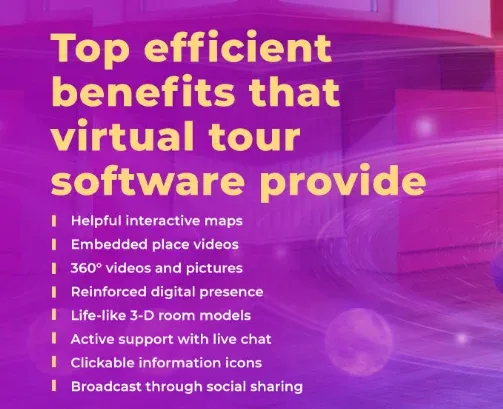
Creating Engaging Virtual Tours
Creating engaging virtual tours requires attention to detail and a focus on providing a comprehensive property overview:
- Highlight Key Features: Focus on unique selling points, such as a modern kitchen or a spacious backyard. An agent in Los Angeles highlighted a property's rooftop terrace in their virtual tour, which became a major selling point.
- Use Quality Equipment: Invest in good cameras and software to ensure high-quality tours. A realtor in Portland used a 360-degree camera to create crisp and detailed virtual tours, impressing potential buyers.
- Provide Narration: Adding voiceover to guide viewers through the property can enhance the experience. An Austin agent narrated their virtual tours, explaining features and benefits, which helped viewers better understand the property.
- Include Interactive Elements: Allow viewers to click on different areas to learn more about specific features. An agent in Boston used interactive tags in their virtual tours to provide additional information about room dimensions and materials used.
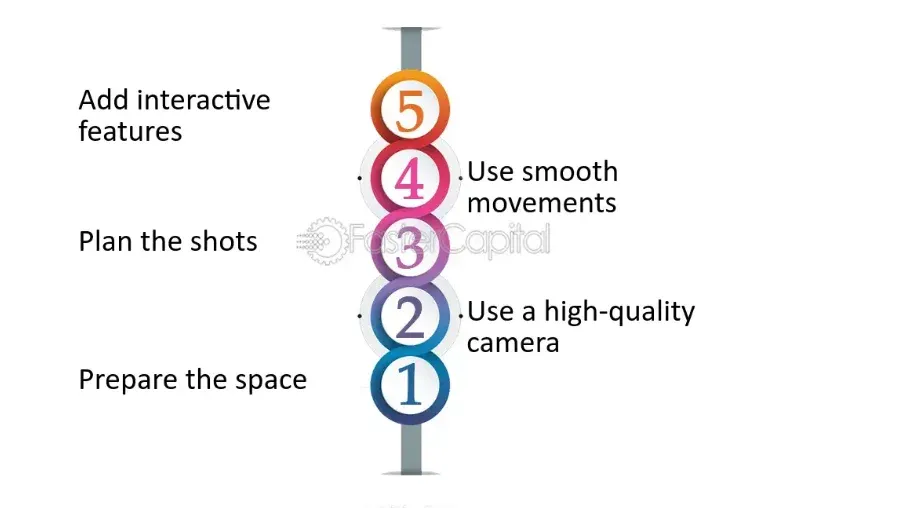
Recommended Virtual Tour and Video real estate marketing tools
To effectively implement virtual tours and video marketing, here are some top real estate marketing tools:
- Matterport: Creates immersive 3D virtual tours. A realtor in Chicago used Matterport to provide detailed virtual walkthroughs, which increased buyer interest and led to quicker sales.
- BombBomb: Allows agents to send video emails and messages. An agent in Dallas used BombBomb to send personalized video updates to clients, enhancing communication and engagement.
- Videolicious: Simplifies video creation for property tours and marketing. A Los Angeles realtor used Videolicious to produce high-quality video tours, attracting more views and inquiries on their listings.
- Animoto: Helps create engaging video content easily. An agent in Boston used Animoto to make professional-looking video ads for properties, which boosted their online presence and generated more leads.
SEO and Content real estate marketing tools
SEO and content marketing are crucial for increasing your online visibility and attracting potential clients. Using the right real estate marketing tools can help you optimize your website and create compelling content.

Importance of SEO in Real Estate Marketing Tools
SEO (Search Engine Optimization) is essential for improving your website's ranking on search engines, making it easier for potential clients to find you:
- Increased Visibility: Higher search engine rankings mean more visibility. A New York agent optimized their website with relevant keywords, leading to increased traffic and more inquiries.
- Targeted Traffic: SEO helps attract the right audience. A realtor in San Francisco used local SEO strategies to attract clients looking for homes in specific neighbourhoods.
- Cost-Effective: Compared to paid advertising, SEO is a cost-effective way to drive organic traffic. An agent in Miami focused on SEO, reducing their reliance on expensive ads while still attracting leads.
Suggested Reading:10 Tips for Effective Real Estate Digital Marketing
Content Marketing Strategies for real estate marketing tools
Creating valuable and engaging content can help establish your authority and attract potential clients:
- Blog Posts: Write about local market trends, buying tips, and property insights. A Chicago agent started a blog discussing neighbourhood features, which attracted more local traffic to their site.
- Video Content: Create videos about property tours, client testimonials, and real estate tips. An agent in Los Angeles produced video content on home staging tips, which garnered significant views and shares.
- Infographics: Use visual content to explain market data and buying processes. A Boston realtor used infographics to simplify complex market statistics, making them more digestible for clients.
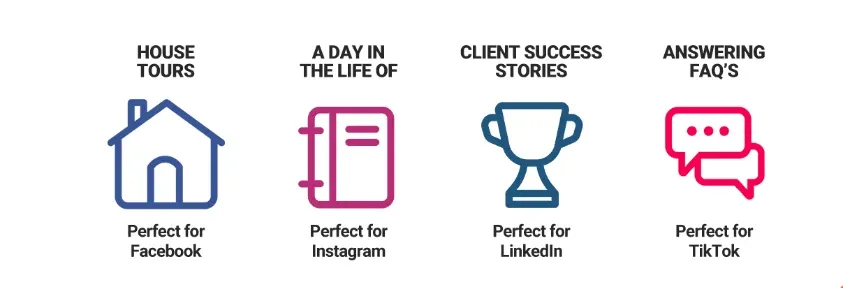
Chatbots and AI-driven real estate marketing tools
Chatbots and AI-driven real estate marketing tools can significantly enhance client interaction and streamline your operations. They provide instant responses and improve overall efficiency.
How Chatbots Enhance Client Interaction
Chatbots can handle initial inquiries, schedule appointments, and provide information, improving client experience:
- Instant Response: Chatbots provide immediate answers to common questions. A realtor in Portland used a chatbot to handle inquiries about property availability, reducing response times and improving client satisfaction.
- 24/7 Availability: They can assist clients outside of business hours. An agent in Miami used a chatbot to answer questions and book viewings even after office hours, increasing their reach.
- Lead Qualification: Chatbots can qualify leads by asking preliminary questions. A New York agent used a chatbot to gather information from potential buyers, streamlining the lead qualification process.
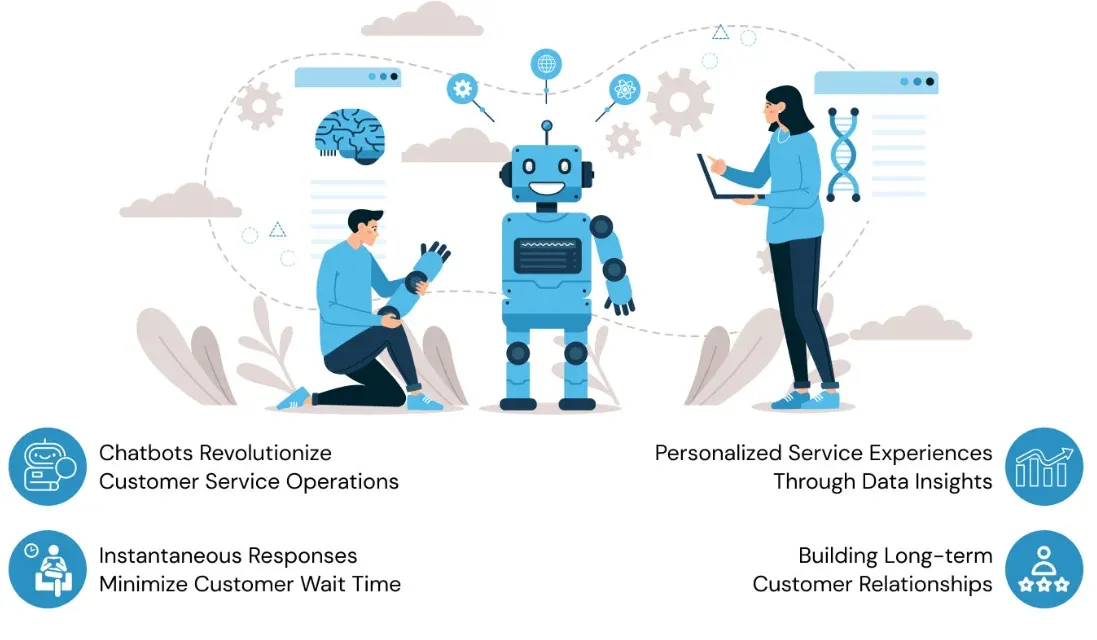
Integrating AI in real estate marketing tools website
Integrating AI into real estate marketing tools can enhance your website's functionality and user experience:
- Personalized Recommendations: AI can suggest properties based on user preferences. A San Francisco realtor used AI to recommend listings to clients, improving engagement and satisfaction.
- Market Analysis: AI real estate marketing tools can provide real-time market analysis and insights. An agent in Los Angeles used AI to track market trends and adjust their strategies accordingly.
Suggested Reading:Chatbots: The ultimate tool for your real estate business!
Recommended Chatbots for real estate marketing tools
Several chatbots can enhance your real estate website and improve client interaction:
- Chatfuel: This chatbot is easy to integrate and customize. A Denver agent used Chatfuel to provide property information and schedule viewings, increasing efficiency.
- ManyChat: Ideal for engaging with clients on social media. A Seattle realtor used ManyChat to manage Facebook messages, improving communication and lead management.
- BotPenguin: A versatile option for realtors, BotPenguin allows seamless integration with various platforms. An agent in Miami used BotPenguin to automate inquiries and provide 24/7 support, enhancing customer experience and freeing up valuable time.
Analytics and Performance Tracking Tools
Tracking your marketing performance is essential to understand what works and what doesn’t. Using analytics real estate marketing tools can help you make data-driven decisions.
Importance of Tracking Marketing Performance
Monitoring your marketing efforts helps you refine your strategies and improve results:
- Identify Trends: Track which marketing tactics are most effective. A Chicago agent used Google Analytics to identify that video content was driving the most traffic, allowing them to focus more on video marketing.
- Optimize Campaigns: Use data to adjust and improve your campaigns. A Boston realtor tracked their email campaign performance, tweaking subject lines and content based on open rates and clicks.
Key Metrics to Monitor for Real Estate Marketing
Focus on these key metrics to gauge your marketing performance:
- Website Traffic: Monitor the number of visitors to your site. An agent in Los Angeles used traffic data to identify peak visit times and optimize posting schedules.
- Conversion Rates: Track how many visitors turn into leads or clients. A Miami realtor analyzed conversion rates from different marketing channels to understand where to invest more.
- Engagement Rates: Measure interactions with your content. A New York agent tracked social media engagement to determine the most effective types of posts.
Conclusion
In conclusion, real estate marketing is constantly evolving with the rise of digital real estate marketing tools, social media, and video marketing. And the need for more personalized content. Incorporating these real estate marketing tools into your strategy can significantly enhance your efficiency and effectiveness.
Digital real estate marketing tools such as virtual tours and SEO real estate marketing tools allow you to showcase properties more effectively and reach potential buyers through improved online visibility. Virtual tours offer an immersive experience, enabling buyers to explore properties remotely, which can expedite decision-making and lead to quicker sales.
SEO tools optimize your online presence, ensuring your listings appear prominently in search results, and driving organic traffic to your website. Social media management platforms help you engage with a broader audience, build your brand, and create targeted advertising campaigns that attract potential clients.
CRM software streamlines your client interactions, automating routine tasks, tracking leads, and maintaining a comprehensive database of client information.
This list of real estate marketing tools is for showcasing your properties, creating promotional materials, generating leads, and working with social media will enable you to take your real estate business to the next level. Take advantage of these real estate marketing tools to grow your business in 2024.
That's all from us, all the best!
Frequently Asked Questions (FAQs)
What are the best digital real estate marketing tools in 2024?
The best tools include CRM software, social media management platforms, virtual tour creators, email marketing services, SEO tools, and automated chatbots to enhance engagement and streamline communication.
How can CRM software benefit real estate agents?
CRM software helps manage client relationships, track interactions, and automate tasks, ensuring agents stay organized, improve follow-ups, and enhance client satisfaction.
What role do virtual tours play in real estate marketing?
Virtual tours provide an immersive experience, allowing potential buyers to explore properties online, increasing engagement and interest, and often leading to faster sales.
Why is social media important for real estate agents?
Social media platforms enable agents to reach a wider audience, showcase properties, build their brand, and engage with potential clients through targeted advertising and content.
How does email marketing enhance real estate sales?
Email marketing allows agents to nurture leads, share property updates, send personalized offers, and maintain regular communication, ultimately driving conversions and fostering client relationships.
What is the impact of SEO real estate marketing tools?
SEO tools help optimize property listings and website content, improving search engine rankings, driving organic traffic, and increasing visibility to potential buyers searching online.

